Perspectives in Criminology: Alcohol Violence and Neoliberalism
VerifiedAdded on 2023/01/18
|6
|1409
|100
Essay
AI Summary
This essay explores the complex relationship between neoliberal ideology and alcohol-related violence in Australia, specifically focusing on the issue of one-punch attacks. It examines how the government's response, including stricter laws and regulations, reflects neoliberal principles of responsibilisation, where individuals are held more accountable for their actions and the risks they pose. The essay delves into the concept of responsibilisation and its impact on individuals' behavior, considering factors such as police presence and attitudes toward the law. It analyzes the 'one-punch killing' law as a manifestation of neo-prohibition, arguing that it aims to reduce alcohol-related violence by altering individual and societal accountability. The essay also discusses the role of alcohol traders and the broader shift towards proactive crime prevention, aligning with the neoliberal philosophy of authority and a move away from welfare models. The conclusion highlights the connection between public debate, political actions, and the influence of neoliberal ideology in addressing alcohol-related violence.
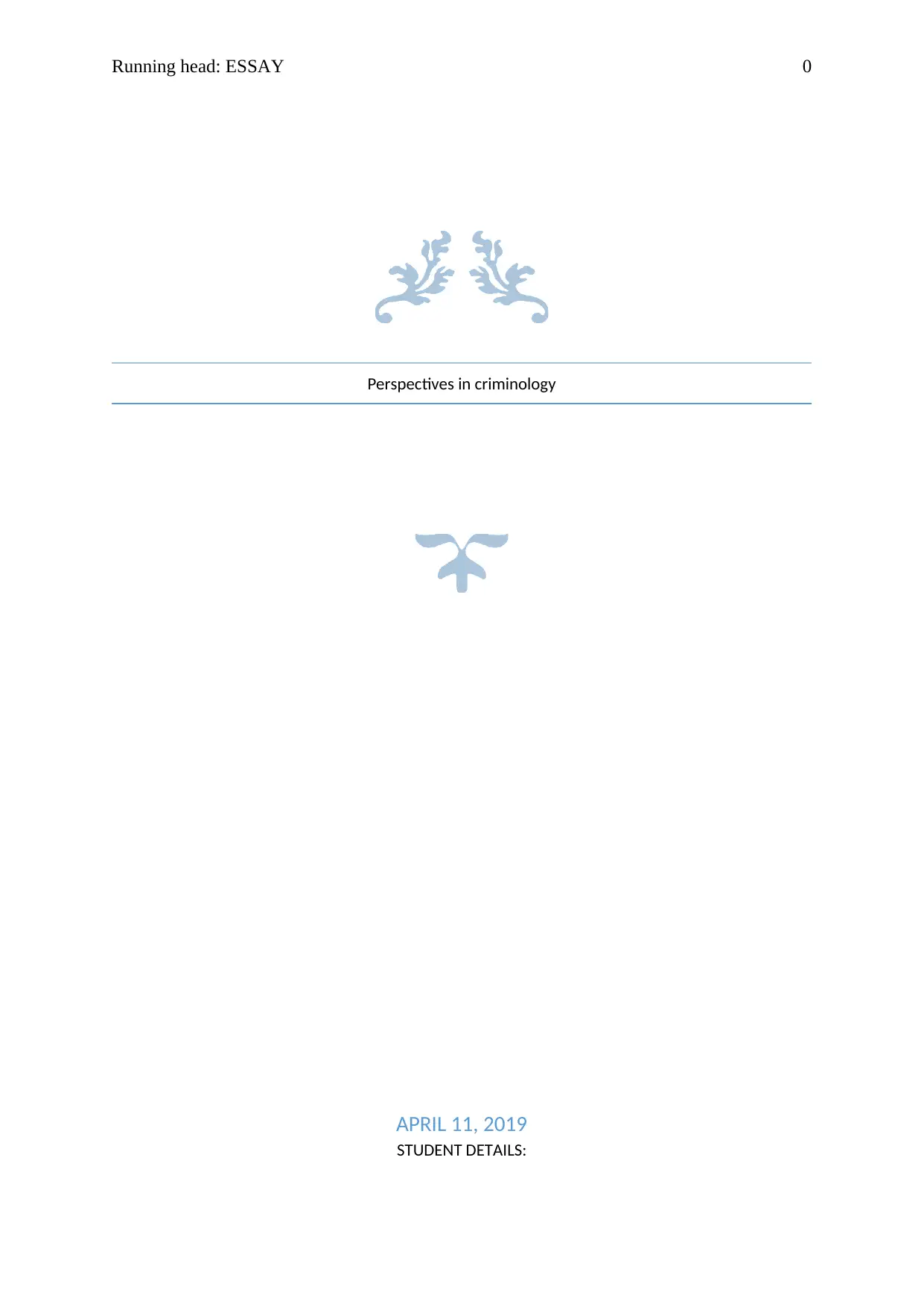
Running head: ESSAY 0
Perspectives in criminology
APRIL 11, 2019
STUDENT DETAILS:
Perspectives in criminology
APRIL 11, 2019
STUDENT DETAILS:
Paraphrase This Document
Need a fresh take? Get an instant paraphrase of this document with our AI Paraphraser
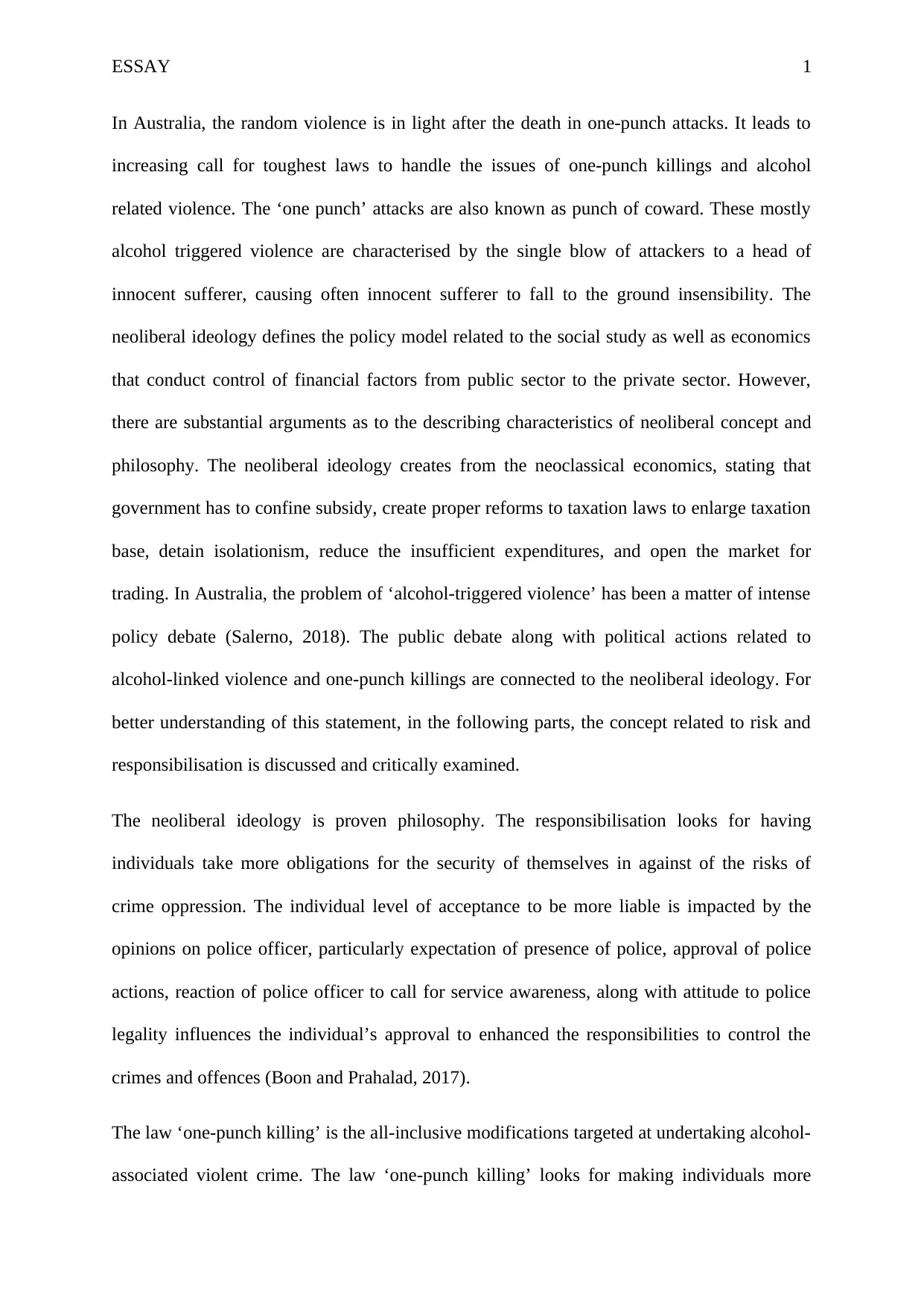
ESSAY 1
In Australia, the random violence is in light after the death in one-punch attacks. It leads to
increasing call for toughest laws to handle the issues of one-punch killings and alcohol
related violence. The ‘one punch’ attacks are also known as punch of coward. These mostly
alcohol triggered violence are characterised by the single blow of attackers to a head of
innocent sufferer, causing often innocent sufferer to fall to the ground insensibility. The
neoliberal ideology defines the policy model related to the social study as well as economics
that conduct control of financial factors from public sector to the private sector. However,
there are substantial arguments as to the describing characteristics of neoliberal concept and
philosophy. The neoliberal ideology creates from the neoclassical economics, stating that
government has to confine subsidy, create proper reforms to taxation laws to enlarge taxation
base, detain isolationism, reduce the insufficient expenditures, and open the market for
trading. In Australia, the problem of ‘alcohol-triggered violence’ has been a matter of intense
policy debate (Salerno, 2018). The public debate along with political actions related to
alcohol-linked violence and one-punch killings are connected to the neoliberal ideology. For
better understanding of this statement, in the following parts, the concept related to risk and
responsibilisation is discussed and critically examined.
The neoliberal ideology is proven philosophy. The responsibilisation looks for having
individuals take more obligations for the security of themselves in against of the risks of
crime oppression. The individual level of acceptance to be more liable is impacted by the
opinions on police officer, particularly expectation of presence of police, approval of police
actions, reaction of police officer to call for service awareness, along with attitude to police
legality influences the individual’s approval to enhanced the responsibilities to control the
crimes and offences (Boon and Prahalad, 2017).
The law ‘one-punch killing’ is the all-inclusive modifications targeted at undertaking alcohol-
associated violent crime. The law ‘one-punch killing’ looks for making individuals more
In Australia, the random violence is in light after the death in one-punch attacks. It leads to
increasing call for toughest laws to handle the issues of one-punch killings and alcohol
related violence. The ‘one punch’ attacks are also known as punch of coward. These mostly
alcohol triggered violence are characterised by the single blow of attackers to a head of
innocent sufferer, causing often innocent sufferer to fall to the ground insensibility. The
neoliberal ideology defines the policy model related to the social study as well as economics
that conduct control of financial factors from public sector to the private sector. However,
there are substantial arguments as to the describing characteristics of neoliberal concept and
philosophy. The neoliberal ideology creates from the neoclassical economics, stating that
government has to confine subsidy, create proper reforms to taxation laws to enlarge taxation
base, detain isolationism, reduce the insufficient expenditures, and open the market for
trading. In Australia, the problem of ‘alcohol-triggered violence’ has been a matter of intense
policy debate (Salerno, 2018). The public debate along with political actions related to
alcohol-linked violence and one-punch killings are connected to the neoliberal ideology. For
better understanding of this statement, in the following parts, the concept related to risk and
responsibilisation is discussed and critically examined.
The neoliberal ideology is proven philosophy. The responsibilisation looks for having
individuals take more obligations for the security of themselves in against of the risks of
crime oppression. The individual level of acceptance to be more liable is impacted by the
opinions on police officer, particularly expectation of presence of police, approval of police
actions, reaction of police officer to call for service awareness, along with attitude to police
legality influences the individual’s approval to enhanced the responsibilities to control the
crimes and offences (Boon and Prahalad, 2017).
The law ‘one-punch killing’ is the all-inclusive modifications targeted at undertaking alcohol-
associated violent crime. The law ‘one-punch killing’ looks for making individuals more
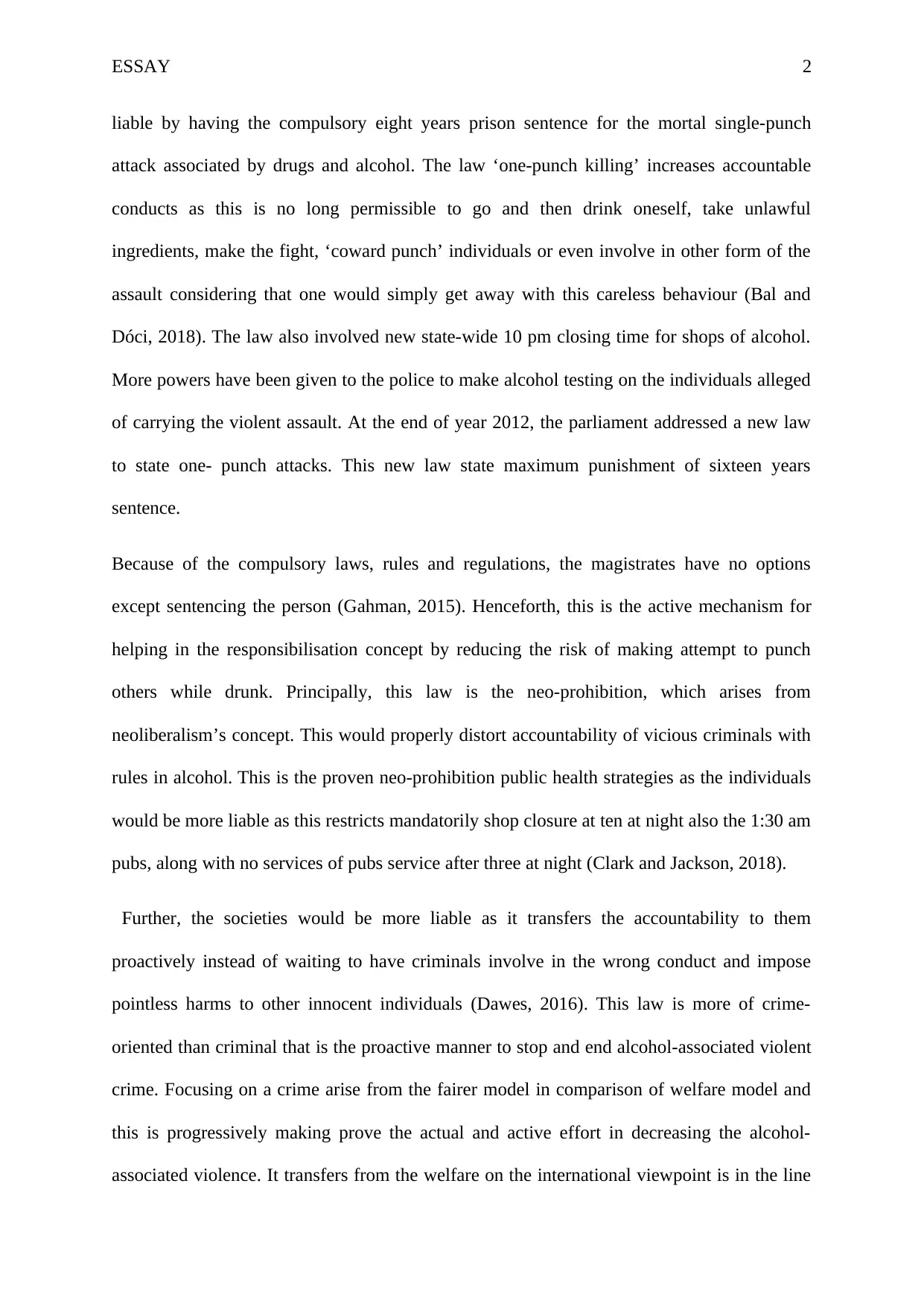
ESSAY 2
liable by having the compulsory eight years prison sentence for the mortal single-punch
attack associated by drugs and alcohol. The law ‘one-punch killing’ increases accountable
conducts as this is no long permissible to go and then drink oneself, take unlawful
ingredients, make the fight, ‘coward punch’ individuals or even involve in other form of the
assault considering that one would simply get away with this careless behaviour (Bal and
Dóci, 2018). The law also involved new state-wide 10 pm closing time for shops of alcohol.
More powers have been given to the police to make alcohol testing on the individuals alleged
of carrying the violent assault. At the end of year 2012, the parliament addressed a new law
to state one- punch attacks. This new law state maximum punishment of sixteen years
sentence.
Because of the compulsory laws, rules and regulations, the magistrates have no options
except sentencing the person (Gahman, 2015). Henceforth, this is the active mechanism for
helping in the responsibilisation concept by reducing the risk of making attempt to punch
others while drunk. Principally, this law is the neo-prohibition, which arises from
neoliberalism’s concept. This would properly distort accountability of vicious criminals with
rules in alcohol. This is the proven neo-prohibition public health strategies as the individuals
would be more liable as this restricts mandatorily shop closure at ten at night also the 1:30 am
pubs, along with no services of pubs service after three at night (Clark and Jackson, 2018).
Further, the societies would be more liable as it transfers the accountability to them
proactively instead of waiting to have criminals involve in the wrong conduct and impose
pointless harms to other innocent individuals (Dawes, 2016). This law is more of crime-
oriented than criminal that is the proactive manner to stop and end alcohol-associated violent
crime. Focusing on a crime arise from the fairer model in comparison of welfare model and
this is progressively making prove the actual and active effort in decreasing the alcohol-
associated violence. It transfers from the welfare on the international viewpoint is in the line
liable by having the compulsory eight years prison sentence for the mortal single-punch
attack associated by drugs and alcohol. The law ‘one-punch killing’ increases accountable
conducts as this is no long permissible to go and then drink oneself, take unlawful
ingredients, make the fight, ‘coward punch’ individuals or even involve in other form of the
assault considering that one would simply get away with this careless behaviour (Bal and
Dóci, 2018). The law also involved new state-wide 10 pm closing time for shops of alcohol.
More powers have been given to the police to make alcohol testing on the individuals alleged
of carrying the violent assault. At the end of year 2012, the parliament addressed a new law
to state one- punch attacks. This new law state maximum punishment of sixteen years
sentence.
Because of the compulsory laws, rules and regulations, the magistrates have no options
except sentencing the person (Gahman, 2015). Henceforth, this is the active mechanism for
helping in the responsibilisation concept by reducing the risk of making attempt to punch
others while drunk. Principally, this law is the neo-prohibition, which arises from
neoliberalism’s concept. This would properly distort accountability of vicious criminals with
rules in alcohol. This is the proven neo-prohibition public health strategies as the individuals
would be more liable as this restricts mandatorily shop closure at ten at night also the 1:30 am
pubs, along with no services of pubs service after three at night (Clark and Jackson, 2018).
Further, the societies would be more liable as it transfers the accountability to them
proactively instead of waiting to have criminals involve in the wrong conduct and impose
pointless harms to other innocent individuals (Dawes, 2016). This law is more of crime-
oriented than criminal that is the proactive manner to stop and end alcohol-associated violent
crime. Focusing on a crime arise from the fairer model in comparison of welfare model and
this is progressively making prove the actual and active effort in decreasing the alcohol-
associated violence. It transfers from the welfare on the international viewpoint is in the line
⊘ This is a preview!⊘
Do you want full access?
Subscribe today to unlock all pages.

Trusted by 1+ million students worldwide
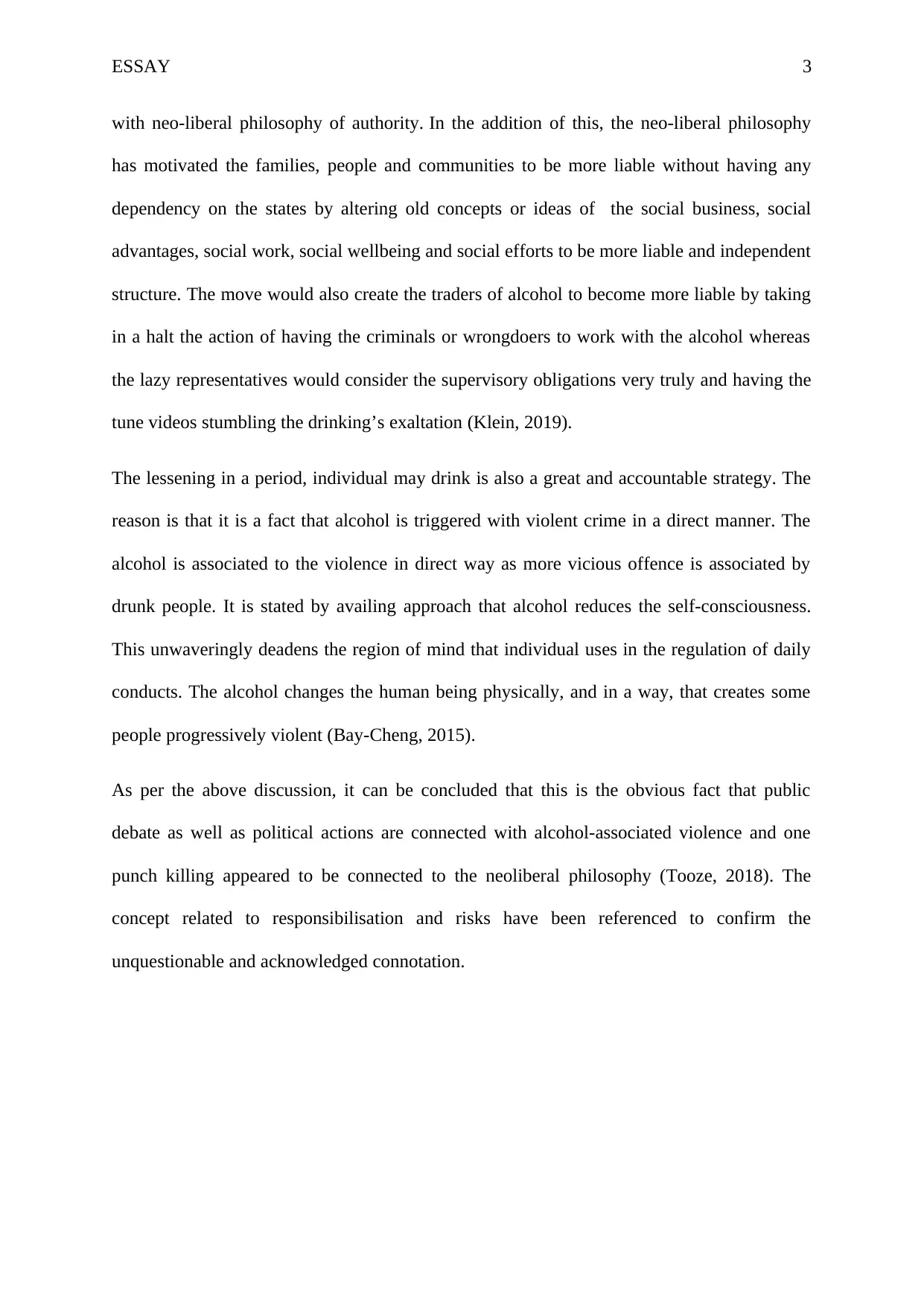
ESSAY 3
with neo-liberal philosophy of authority. In the addition of this, the neo-liberal philosophy
has motivated the families, people and communities to be more liable without having any
dependency on the states by altering old concepts or ideas of the social business, social
advantages, social work, social wellbeing and social efforts to be more liable and independent
structure. The move would also create the traders of alcohol to become more liable by taking
in a halt the action of having the criminals or wrongdoers to work with the alcohol whereas
the lazy representatives would consider the supervisory obligations very truly and having the
tune videos stumbling the drinking’s exaltation (Klein, 2019).
The lessening in a period, individual may drink is also a great and accountable strategy. The
reason is that it is a fact that alcohol is triggered with violent crime in a direct manner. The
alcohol is associated to the violence in direct way as more vicious offence is associated by
drunk people. It is stated by availing approach that alcohol reduces the self-consciousness.
This unwaveringly deadens the region of mind that individual uses in the regulation of daily
conducts. The alcohol changes the human being physically, and in a way, that creates some
people progressively violent (Bay-Cheng, 2015).
As per the above discussion, it can be concluded that this is the obvious fact that public
debate as well as political actions are connected with alcohol-associated violence and one
punch killing appeared to be connected to the neoliberal philosophy (Tooze, 2018). The
concept related to responsibilisation and risks have been referenced to confirm the
unquestionable and acknowledged connotation.
with neo-liberal philosophy of authority. In the addition of this, the neo-liberal philosophy
has motivated the families, people and communities to be more liable without having any
dependency on the states by altering old concepts or ideas of the social business, social
advantages, social work, social wellbeing and social efforts to be more liable and independent
structure. The move would also create the traders of alcohol to become more liable by taking
in a halt the action of having the criminals or wrongdoers to work with the alcohol whereas
the lazy representatives would consider the supervisory obligations very truly and having the
tune videos stumbling the drinking’s exaltation (Klein, 2019).
The lessening in a period, individual may drink is also a great and accountable strategy. The
reason is that it is a fact that alcohol is triggered with violent crime in a direct manner. The
alcohol is associated to the violence in direct way as more vicious offence is associated by
drunk people. It is stated by availing approach that alcohol reduces the self-consciousness.
This unwaveringly deadens the region of mind that individual uses in the regulation of daily
conducts. The alcohol changes the human being physically, and in a way, that creates some
people progressively violent (Bay-Cheng, 2015).
As per the above discussion, it can be concluded that this is the obvious fact that public
debate as well as political actions are connected with alcohol-associated violence and one
punch killing appeared to be connected to the neoliberal philosophy (Tooze, 2018). The
concept related to responsibilisation and risks have been referenced to confirm the
unquestionable and acknowledged connotation.
Paraphrase This Document
Need a fresh take? Get an instant paraphrase of this document with our AI Paraphraser
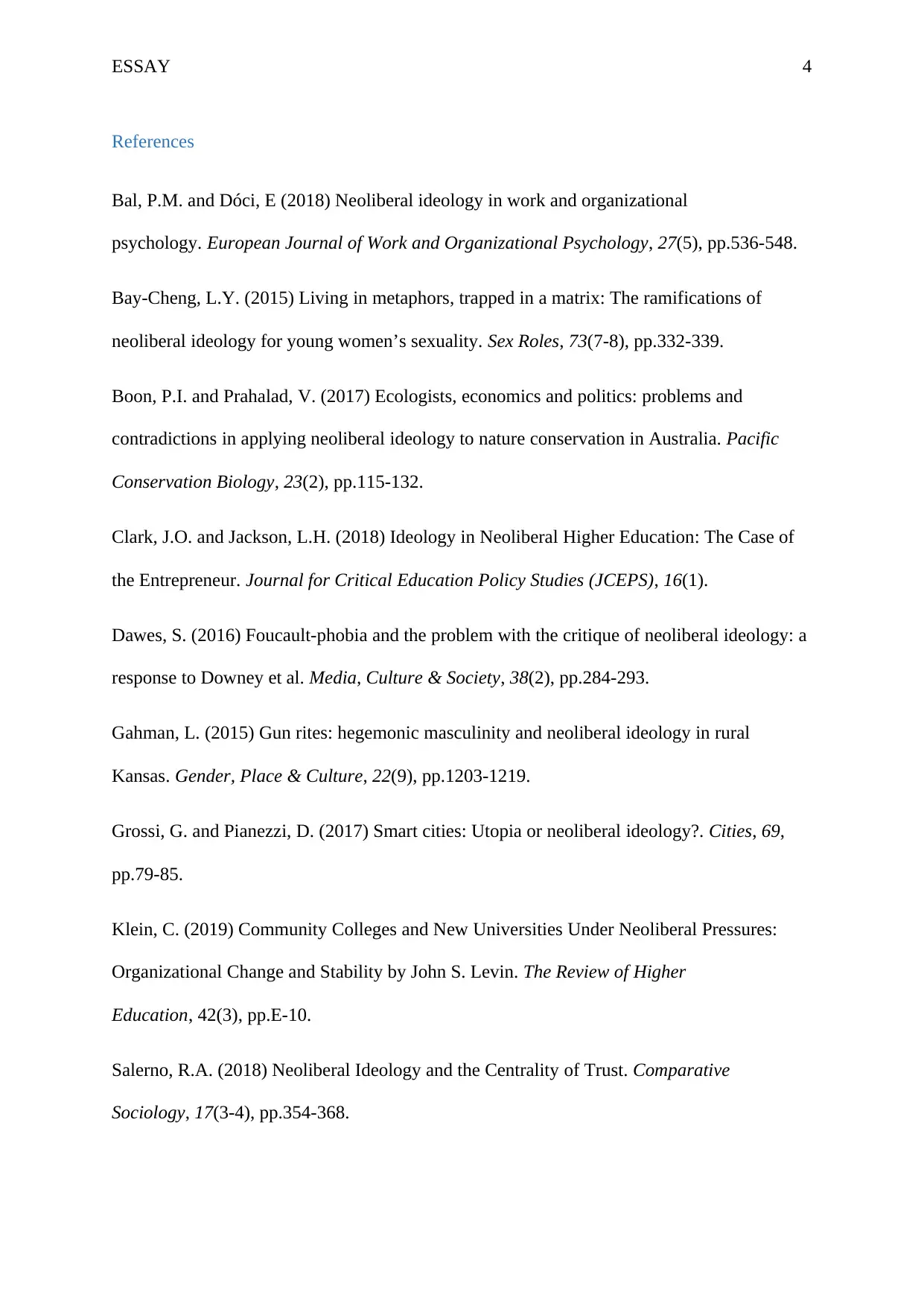
ESSAY 4
References
Bal, P.M. and Dóci, E (2018) Neoliberal ideology in work and organizational
psychology. European Journal of Work and Organizational Psychology, 27(5), pp.536-548.
Bay-Cheng, L.Y. (2015) Living in metaphors, trapped in a matrix: The ramifications of
neoliberal ideology for young women’s sexuality. Sex Roles, 73(7-8), pp.332-339.
Boon, P.I. and Prahalad, V. (2017) Ecologists, economics and politics: problems and
contradictions in applying neoliberal ideology to nature conservation in Australia. Pacific
Conservation Biology, 23(2), pp.115-132.
Clark, J.O. and Jackson, L.H. (2018) Ideology in Neoliberal Higher Education: The Case of
the Entrepreneur. Journal for Critical Education Policy Studies (JCEPS), 16(1).
Dawes, S. (2016) Foucault-phobia and the problem with the critique of neoliberal ideology: a
response to Downey et al. Media, Culture & Society, 38(2), pp.284-293.
Gahman, L. (2015) Gun rites: hegemonic masculinity and neoliberal ideology in rural
Kansas. Gender, Place & Culture, 22(9), pp.1203-1219.
Grossi, G. and Pianezzi, D. (2017) Smart cities: Utopia or neoliberal ideology?. Cities, 69,
pp.79-85.
Klein, C. (2019) Community Colleges and New Universities Under Neoliberal Pressures:
Organizational Change and Stability by John S. Levin. The Review of Higher
Education, 42(3), pp.E-10.
Salerno, R.A. (2018) Neoliberal Ideology and the Centrality of Trust. Comparative
Sociology, 17(3-4), pp.354-368.
References
Bal, P.M. and Dóci, E (2018) Neoliberal ideology in work and organizational
psychology. European Journal of Work and Organizational Psychology, 27(5), pp.536-548.
Bay-Cheng, L.Y. (2015) Living in metaphors, trapped in a matrix: The ramifications of
neoliberal ideology for young women’s sexuality. Sex Roles, 73(7-8), pp.332-339.
Boon, P.I. and Prahalad, V. (2017) Ecologists, economics and politics: problems and
contradictions in applying neoliberal ideology to nature conservation in Australia. Pacific
Conservation Biology, 23(2), pp.115-132.
Clark, J.O. and Jackson, L.H. (2018) Ideology in Neoliberal Higher Education: The Case of
the Entrepreneur. Journal for Critical Education Policy Studies (JCEPS), 16(1).
Dawes, S. (2016) Foucault-phobia and the problem with the critique of neoliberal ideology: a
response to Downey et al. Media, Culture & Society, 38(2), pp.284-293.
Gahman, L. (2015) Gun rites: hegemonic masculinity and neoliberal ideology in rural
Kansas. Gender, Place & Culture, 22(9), pp.1203-1219.
Grossi, G. and Pianezzi, D. (2017) Smart cities: Utopia or neoliberal ideology?. Cities, 69,
pp.79-85.
Klein, C. (2019) Community Colleges and New Universities Under Neoliberal Pressures:
Organizational Change and Stability by John S. Levin. The Review of Higher
Education, 42(3), pp.E-10.
Salerno, R.A. (2018) Neoliberal Ideology and the Centrality of Trust. Comparative
Sociology, 17(3-4), pp.354-368.
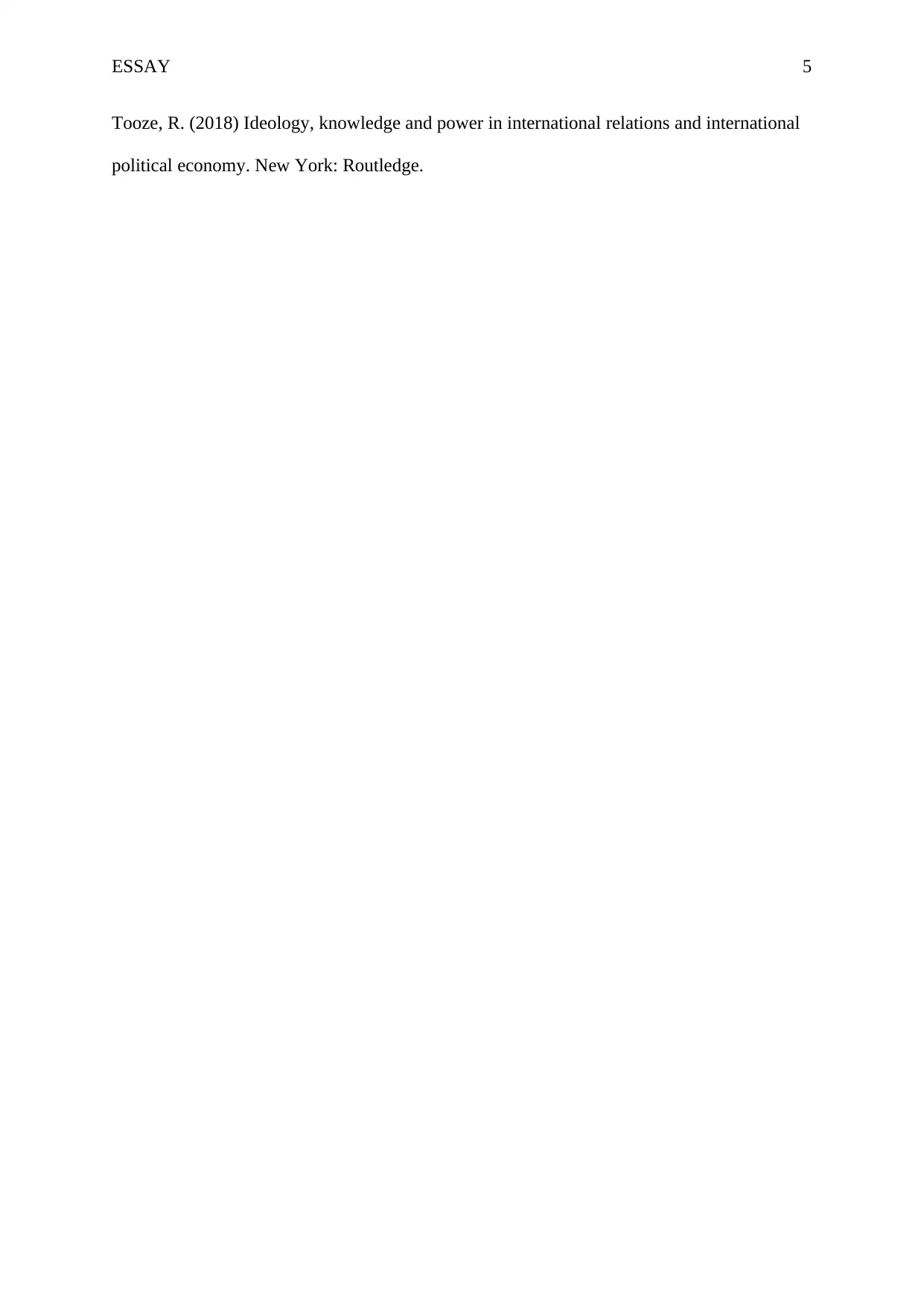
ESSAY 5
Tooze, R. (2018) Ideology, knowledge and power in international relations and international
political economy. New York: Routledge.
Tooze, R. (2018) Ideology, knowledge and power in international relations and international
political economy. New York: Routledge.
⊘ This is a preview!⊘
Do you want full access?
Subscribe today to unlock all pages.

Trusted by 1+ million students worldwide
1 out of 6
Your All-in-One AI-Powered Toolkit for Academic Success.
+13062052269
info@desklib.com
Available 24*7 on WhatsApp / Email
![[object Object]](/_next/static/media/star-bottom.7253800d.svg)
Unlock your academic potential
Copyright © 2020–2026 A2Z Services. All Rights Reserved. Developed and managed by ZUCOL.

